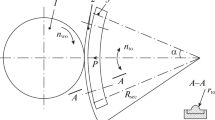Abstract
It is shown how the intrinsic heat generation and its dependence on the temperature can be derived from existing experimental data for five well known plastic materials. In a dynamic test of cylindrical samples which remain in a stationary state, the frequency of the oscillating load as a function of the maximum temperature of the sample provides a response function which characterizes the thermal steady state of the samples. For this response function, continuous-limit curves are derived by a simple approximation procedure.
Similar content being viewed by others
References
D.Meinköhn: “Untersuchung der Lösungsverzweigung nichtlinearer Randwertprobleme mit gleichmäßig elliptischem Differentialoperator aus der Theorie der stationären irreversiblen Prozesse der Thermodynamik”; Habilitationsschrift 1976, Fachbereich Chemie der Freien Universität Berlin
D.Meinköhn: Zeitschr. Angew. Math. Phys. (ZAMP), submitted
G.Fuhrmann: “Untersuchungen zur Klärung des Verhaltens thermoplastischer Kunststoffe bei Wechseldehnungsbeanspruchung”; Bericht d. Bundesanstalt für Materialprüfung Nr. 31, Berlin (1975)
G.Fuhrmann: Materialprüf.20, 52–57 (1978)
M.Abramowitz, I.Stegun (eds.): Handbook of Mathematical Functions (Dover Publ., New York 1965)




